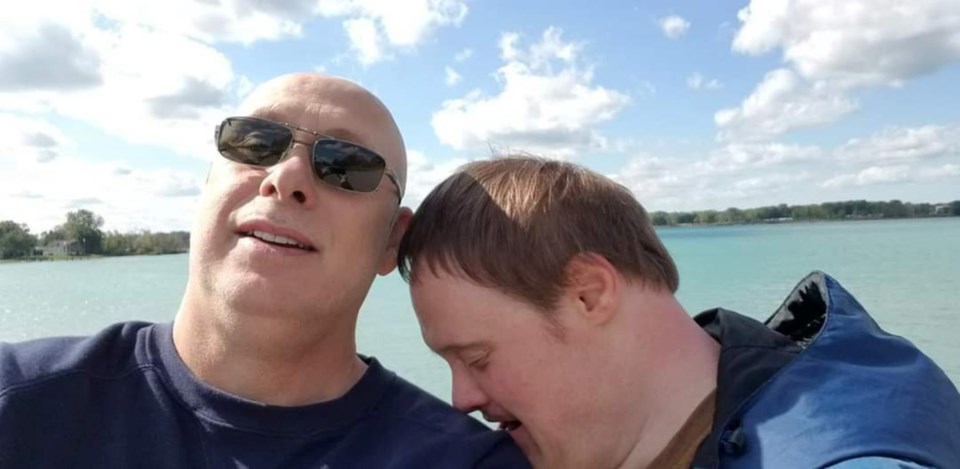Troy Shantz
Some of Sarnia-Lambton’s most vulnerable residents have been ignored in the COVID-19 vaccine rollout, says Brian Kershaw.
Kershaw is the primary caregiver of Mark Zamodits, a Sarnia resident with Down syndrome and autism, and one of 59 severely disabled Community Living Sarnia-Lambton clients living in congregate settings, or group homes.
“They were overlooked,” Kershaw said. “You would have thought they’d be part of a priority group for the first phase of the vaccinations.”
First in line for shots in Sarnia-Lambton were residents of senior homes and front-line medical workers. People 80 years of age and older and their essential caregivers began booking appointments March 15.
Mark Zamodits, who is also legally blind and has a compromised immune system, is at exceptionally high risk to contract COVID-19, Kershaw said. He can’t wear a mask, lives with other housemates, and requires almost 24-hour care from staff working in close physical proximity.
“If Mark gets it, the other clientele in his home are all high-risk as well,” he said.
Kershaw has been caring for Zamodits for 34 years and became his “adopted brother” and legal guardian after Zamodits’ parents and brother died.
Another vulnerable resident is Laurie Anderson, said her husband Bill.
The 67-year-old Sarnia woman has muscular dystrophy, requires 24/7 care, and her weakened heart and lungs would not survive a bout of COVID-19, Bill Anderson said.
“If I walked into the house and brought in COVID after an essential trip… she would die,” said Anderson, her sole caregiver. “Her system wouldn’t take it. She’s been told that.”
He has appealed to the federal and provincial government for help without success.
“Ontario is prioritizing older citizens for vaccines but some with disability are more likely to succumb,” he said.
Muscular Dystrophy Canada agrees.
“All Canadians are included in vaccine roll-out plans, but persons with (muscular dystrophy) are not receiving the prioritization... despite the fact that they are at high risk for exposure, and life-threatening complications,” the charity says.
No Community Living resident in Sarnia has yet tested positive for COVID-19, said executive director John Hagen. But a viral outbreak at one of its group homes is a constant threat.
“Any day and any time that shoe could drop,” Hagen said. “It gets very, very complex very, very quickly.”
Lambton Public Health said via email that people living in congregate care facilities, like Zamodits, will be part of Phase 2 of Ontario’s vaccine rollout.
Phase 2 is expected to start sometime in April and continue until June. It will include older adults, beginning with those under 80 and decreasing in five-year increments.
Phase 2 also covers font-line essential workers, including first responders and education workers, and people with high-risk chronic conditions.
Group home workers are part of Phase 1 but they are further down the list, said spokesperson Kelly Francis.
“We are still working our way through this group.”
Hagen confirmed group homes staff were recently offered shots for vaccination appointments that go unfilled. As of last week, about 80 workers had signed up and more than 20 had received shots, he said.
“Our board and our families wish they’d been in the first category. But we’ve been reassured (vaccines) would be coming very soon.”
Health officials acknowledge the similarities between Community Living congregate settings and long-term care homes. But the average age of a Community Living client is much younger, making them lower risk for severe outcomes from COVID-19, Lambton Public Health said.
Community Living asked Sarnia-Lambton MPP Bob Bailey in January for help in getting its clients higher priority.
“We are extremely concerned that the particular circumstances of our supported people with special needs will be overlooked, if we don't advocate for them,” board president Lorna Cooper wrote in a letter.
“And we therefore request your assistance with this effort.”
Phase 3 of the vaccine rollout is expected to run from June to August, when the remaining population that wants a shot can get one.
